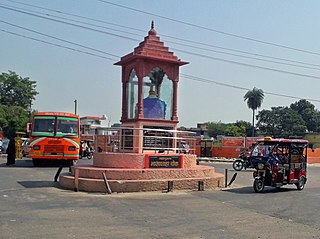
Budaun is a medieval city and headquarters of Budaun district, in the Indian state of Uttar Pradesh. It is located about a mile east of the Sot river, and 27 km north of the Ganges, in the Rohilkhand region of Uttar Pradesh. According to the 2011 census, it has a population of 159,221, which is projected at 161,555 at present. Budaun rose to historical importance as the capital of the Delhi Sultanate for four years from 1210 CE to 1214 CE during the reign of Sultan Iltutmish. It was the most important post of Northern Frontier during Mughal reign. Budaun is a big market, historically famous and religiously important city. Budaun is 230 km south-east of New Delhi and 245 km north-west of Lucknow, both taking about 6 hours by road.

The Meghwal or Meghwar people live primarily in northwest India, with a small population in Pakistan. Their traditional occupation was agricultural farming, cattle-herding and weaving. Meghwals are known for their contribution to embroidery and the textile industry. Most are Hindu by religion, with Rishi Megh, Kabir, Ramdev Pir and Bankar Mataji as their chief gods.
Khilji or Khiljee is a village in western part of Nepal which is part of Bhumikasthan Municipality of the Arghakhanchi district.

S. Abdul Hameed known by his pen name Manushya Puthiran is a poet and writer from Tamil Nadu, India.
Rajavolu is a village in Guntur district of the Indian state of Andhra Pradesh. It is the located in Cherukupalle mandal of Repalle Revenue Divison. PWS water scheme provides water to the residents.
UMS Minye Theinkhathu (71) is a Sindhughosh (Kilo)-class submarine owned by the Myanmar Navy. It is the first of two submarines procured by the country's navy, followed by the UMS Minye Kyaw Htin. Before being acquired by Myanmar, it served in the Indian Navy as INS Sindhuvir (S58).
Pragoti Industries Limited (PIL) is a Bangladeshi car assembling and car parts manufacturing company headquartered in Chittagong with a manufacturing plant in Barabkunda. Founded in 1966, it is the country's largest car assembling plant and it has assembled and marketed more than 50,000 vehicles such as cars, SUVs, buses, trucks, pickups, ambulances, tractors of multiple models by importing CKD kits from overseas.
Common Service Centers (CSCs)
Dr. Akshaykumar Malharrao Kale born 27 July 1953, is a critic of modern Marathi poetry, and was Professor and Head of Marathi Department in RTM Nagpur University, Nagpur, India. In the field of criticism of modern Marathi poetry, his contributions have attracted the attention of scholars of Marathi language and literature throughout Maharashtra. He was the president of prestigious 90th Akhil Bharatiya Marathi Sahitya Sammelan held in Dombivali. Kale is also member of general Council of Sahitya Akademi, India.
Panch Kalyanaka are the five chief auspicious events that occur in the life of tirthankara in Jainism. They are commemorated as part of many Jain rituals and festivals.
Sirumalaikottai is a village panchayat in Tamil Nadu, India. It is located in Ramanathapuram district, Thiruvadanai Taluk. The nearest towns are Devakottai, Karaikudi, and Thiruvadanai.
Dr. Anil Sapkal is an academic, creative writer in Marathi and a film maker. In 2014 he became a Professor at Marathi Department, University of Mumbai. He wrote the screen play and dialogue for the recent Marathi feature film Dhol Taashe.
Dosar, also known as Dhusar, is a Vaishya community in North India that originated in the Dhosi hill region near Rewari in the Indian state of Haryana. The Dosar Vaishya community has a royal background in ancient times. In ancient times, people from dosar vaishya community were zamindars, kings or traders of weapons & ayurvedic medicines.

Chakrapani Chalise was a Nepalese poet. He wrote the words of the first national anthem of Nepal in 1924 AD to the music composed by Bakhat Bahadur Budhapirthi in 1899 AD. The musical part of anthem was created during Prime Minister Bir Shamsher Jang Bahadur Rana's era. Later the Nepali Language Publications Committee was ordered to write words for the anthem. Chakrapani being assistant to Superintendent of the Committee, wrote the words for the anthem.

Hathazari Government University College is a government-run, honors-level, degree college in Hathazari Upazila, Chittagong District, Bangladesh. It was founded in 1968.
The Military Institute of Technology (MILIT) is a tri-services training institution of the Ministry of Defence of the Republic of India. Located at Pune, it trains selected officers of the three services of Indian Armed Forces and officers from friendly foreign countries for command and staff appointments. It conducts the Defence Services Technical Staff Course (DSTSC) for officers Indian Army, Indian Navy and Indian Airforce. The institute has a faculty of senior officers from all three services and scientists who provide specialized training on technologies, military warfare, procurement procedures and operational logistics to the student officers. The course trains officers to handle senior commands and staff appointments in the future. On successful completion of the course the officers are awarded with a degree of M.Sc in Military Technology from Pune University. Officers in the service bracket of 9 to 14 years attend this course. Most officers attending this course are of the rank of Lieutenant Colonel or Major and equivalent.
Mrikanda is a sage in Hindu mythology. He is the husband of Manasvini and the father of Markandeya.
Major-General Golam Mawla is a retired military officer, a Bangladeshi politician from Bogra District of Bangladesh, and a former member of parliament elected from the Bogra-3 constituency in February 1996.
Kasiviswanathar Temple is a historical Hindu temple dedicated to Lord Shiva, situated in Walajapet neighbourhood, Ranipet in the state of Tamil Nadu in the peninsular India. This temple is built around 300 years ago.





